In the “Gezellige Poëzie” column, Laura Wetherington reports on poetry communities in Europe: festivals, independent bookshops and reading series, and innovations on and off the page. Read about the column title here.
The 48th Poetry International Festival Rotterdam, The Netherlands
Ik→Wij / I→We
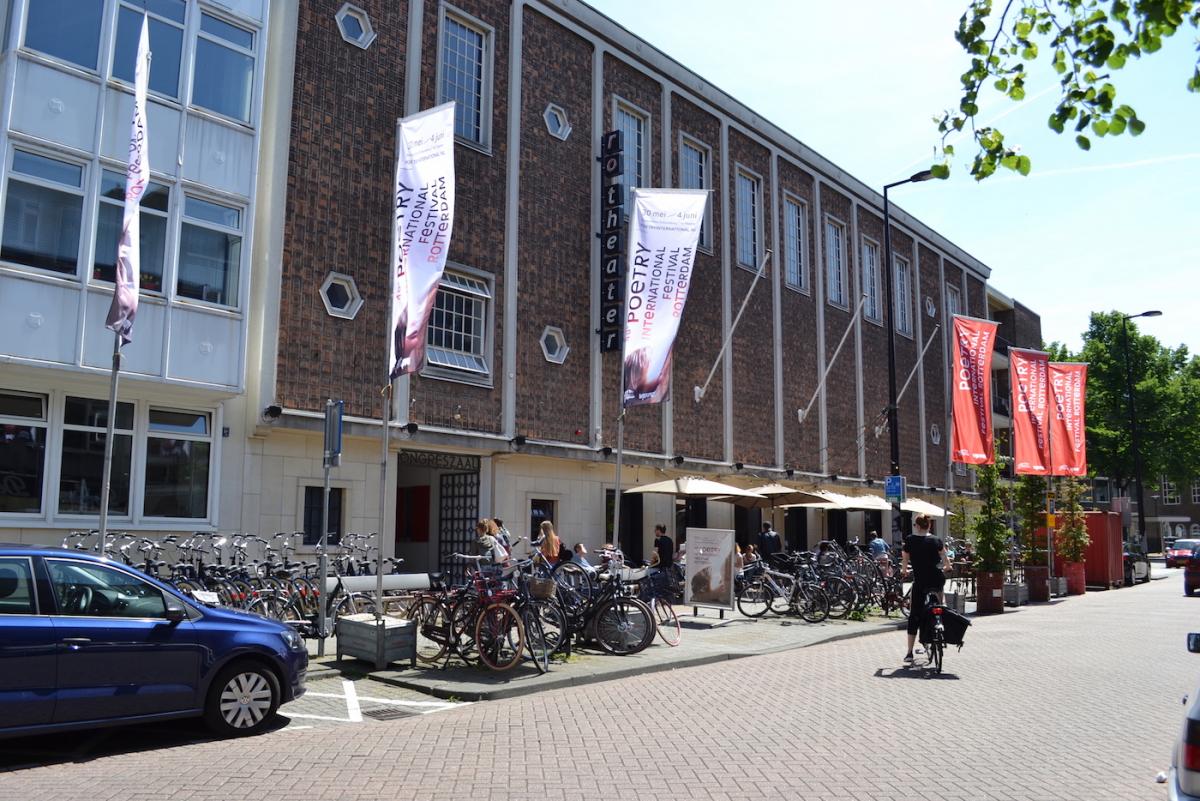
The festival flags welcome poetry-lovers from all over the world at the Ro Theater, one of five venues that hosted the festival.
In the late spring of almost every year since the early seventies, the Dutch city of Rotterdam has been flooded with poets coming to be a part of the Poetry International Festival Rotterdam. For close to a week, the city becomes an international poetry hub. The theme for this year’s event was “I”—“ik” in Dutch—broadly conceived. If you can imagine a concern about the self and contemporary poetry, that concern was represented; there were questions about public and private selves, about the I that reads to the audience and the I in the poem being read, about the social function of the I who writes the poem, and about the number of stylistic approaches a single I can conjure. I say “broadly conceived” because some of the events were not directly connected—or they allowed the participants to forget the festivities had a theme—whereas other events were immediately apparent.
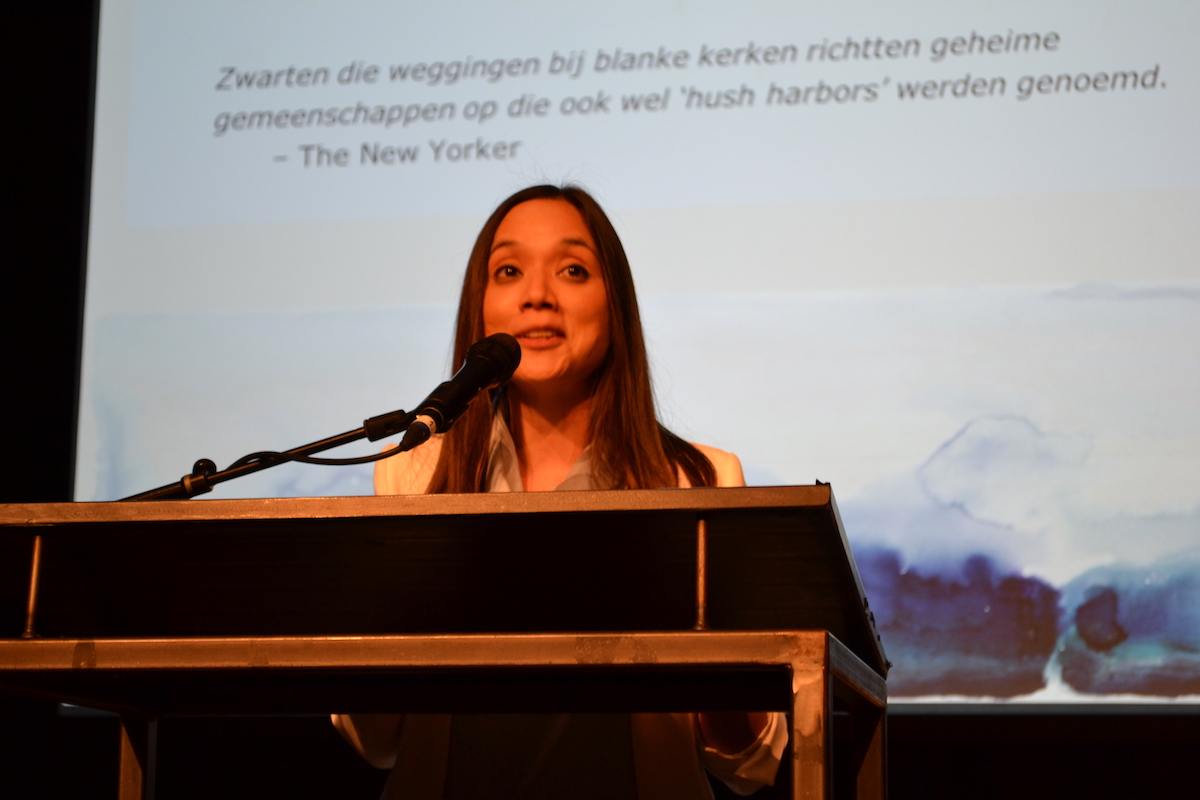
Mookie Katigbak-Lacuesta
Mookie Katigbak-Lacuesta delivered a talk at once hilarious and searing which investigated the lyric I—complete with its contemporary critiques of its narcissism—through the lens of a carefully depicted social media self. Katigbak-Lacuesta paired Gillian White’s Lyric Shame with a Facebook post her fortysomething husband made about buying an expensive pair of “millennial” prime knit shoes. Because she began by talking about shoes, I found myself studying her fashion sense, which struck me as something like a modernized, casual Jackie-O. She stood at the podium in a black, tailored blazer, a black-and-white-striped shirt, and a sunburst-yellow A-line skirt. By yoking together the lyric I’s egocentrism and I-centered online sharing, she pointed out that “the curated self on social media has spawned a lyric comeback.” Centering the self on social media is complicated by, she suggested, the public reaction to seemingly private utterances. The lyric poem and the Facebook profile share this same artifice. Her talk read like a poem, singing the iconic feelings of our age: “shame ghosts my every post.” She raised difficult and necessary questions about the superficiality of a created self and the ramifications of its public airing, such as “On social media, shame is inescapable, and if shame is inescapable, how do I construct a self that’s impervious to shame?” The public nature of social media means that we’re choosing the version of the self we put forward and when we’re “compelled to voice out a dissenting opinion, there are ten varieties of the smiley emoticon to soften the blow.” She addressed the paradoxes of our age with humor and I was burning with questions after her talk, like, “To what extent is social media training us to curate our poetic selves in the same way as we do on Facebook or Twitter?” and “ What’s the equivalent of softening the blow in a poem?” and “How can I stop doing that?” But rather than inquire about any of this, afterward I waited in a huddle of admirers to ask her in my characteristic grandma phrasing, “What are these shoes the young people are wearing nowadays?” She replied, “these,” and turned her foot sideways to model a rather cute pair of kicks. Her eyes glinted. “They’re much cheaper here than in Manila.”
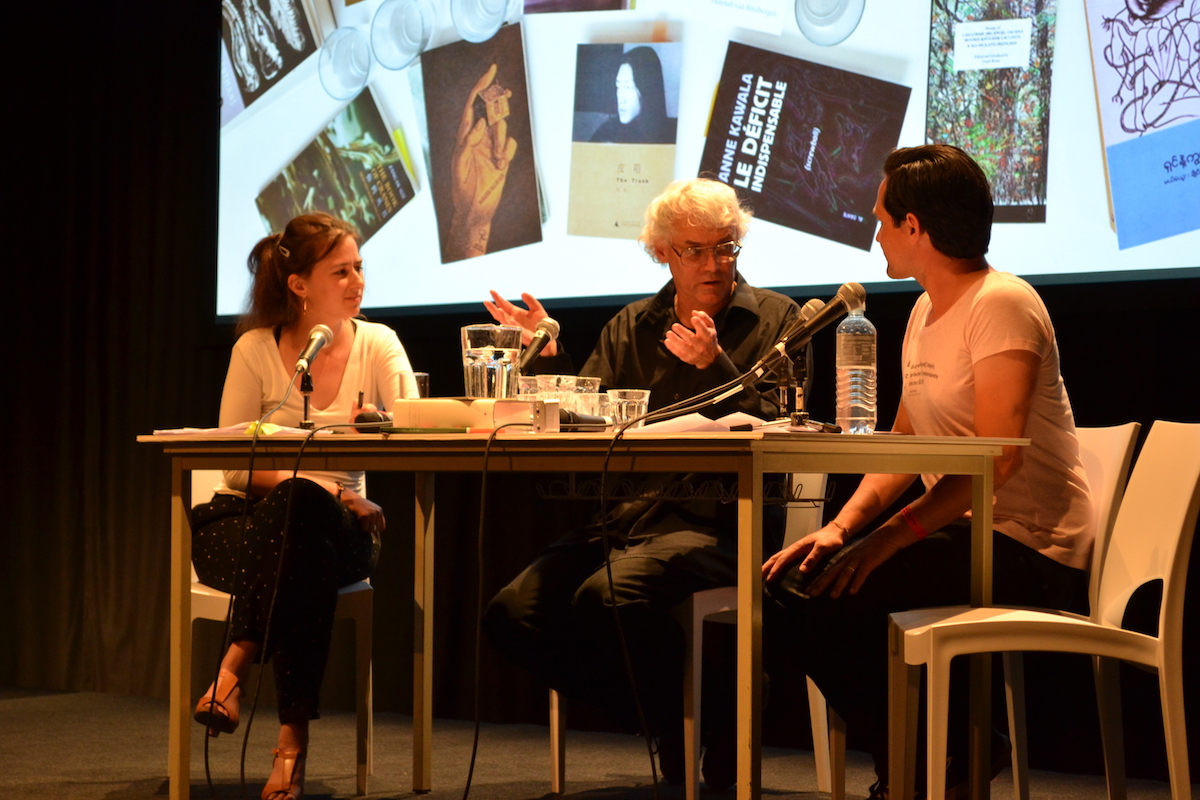
John Kinsella at the Poësiecafe
The afternoon programs followed one of several formats: there were ITalks, a collection of lectures and videos about the festival theme like Katigbak-Lacuesta’s presentation; there were Poësiecafes, hour and a half programs where interviewers gather around a kitchen table for casual conversation with three or four different poets in succession; and there were Poetry Shorts, a session with three rapid-fire readings. The evening events were often more singular—there were the opening and closing ceremonies, complete with musical compositions knitting the poets’ with the I-theme. There was also a radio play and an award ceremony for the best Dutch debut collection, for example.
I scooted into Thursday’s Poetry Shorts a little early and encountered a white man at the podium with a shock of white, wavy hair, wearing a slightly oversized black button down shirt and equally baggy black slacks. He was working with the staff to adjust the lighting for his reading. He spoke in English to the woman standing next to him, who would then communicate with the lighting crew in Dutch. Judging by the number of lights that turned on or off and back again, or dimmed to varying degrees, it’s possible the crew was simply playing a lighting glissando, but the man kept squinting. Finally he said, “It’s that one, really” and flicked a gesture somewhere between a point and a wave toward his left. He was gruff; he had an air of chronic discontent. I’m not sure that the lights ever got to be the way he wanted them, but he said an unsmiling “thank you” and sat down. I wondered if he knew how terse he seemed. Once the program was well underway and the introducer called the final poet to the stage, I realized this gruff-muffin was John Kinsella, which made me reassess my own abrupt judgments. Here was a man who has spent his life resisting the structures of the state, which would make anyone, well, a little tired. If I have so much energy for politeness (and assessing the politesse of others), maybe I’m the one doing it wrong.
A festival at its best has this capacity to snap us out of preconceptions. Life is a continual process of waking. John Kinsella woke me up. While reading, he held the edges of the podium and repeatedly rocked back on one heel, making some semblance of a short bow. He was the first in this set to speak in between his poems, and he introduced his work by saying his family immigrated to Australia from Ireland in the 1850s, but he cannot forget that this was an act of colonial violence in which he is complicit. He referred to his work as the “grotesque of the rural” and said “As a vegan, the ‘I’ is a part of the community.”
Kinsella was the kind of kid who requested a Red Cross passport because, in his words, “all states are problems for me. Even left wing states are not left enough.” That is to say, he was a singular kind of kid, intensely concerned with ethics. His poem “Skeleton Weed/Generative Grammar” details a moment when, as a young boy, he had the job of finding all the skeleton weed seeds in a farmer’s field so the crop would not be ruined. When his crew fails and the crop has to be quarantined, the owner blames the young workers for ruining not only that year’s harvest, but his marriage, his life: “His son's & daughter’s places / at their exclusive city boarding / schools. His problem with alcohol. / His subsequent breakdown.” Kinsella’s speaker recasts the terms of the work they were asked to do and reframes what it means to be stewards of the land:
Speaking for myself,
I’ve included in my lexicon of guilt
the following: what I feel today
will I feel tomorrow? And those tight
yellow flowers: so beautiful on the wiry
structures they call ‘skeleton weed’.
The two poets whose work I felt most drawn to at this year’s festival are on the surface so different—one deconstructing the lyric self in the context of social media and the other writing poetry as an extension of environmental activism. However, the underlying question for both poets is the same: what is the self’s responsibility to the community? Katigbak-Lacuesta examined how we navigate private feelings in a public, constructed version of a social self. For Kinsella, the poem stands as a complement to the physical body in protest: how can a poem stand up and do justice work? By the end of the festival I understood that the loosely-knit theme of “I” was a careful decision in order to make room for the collective. One must give way to the other. The I (ik) gives way to we (wij).
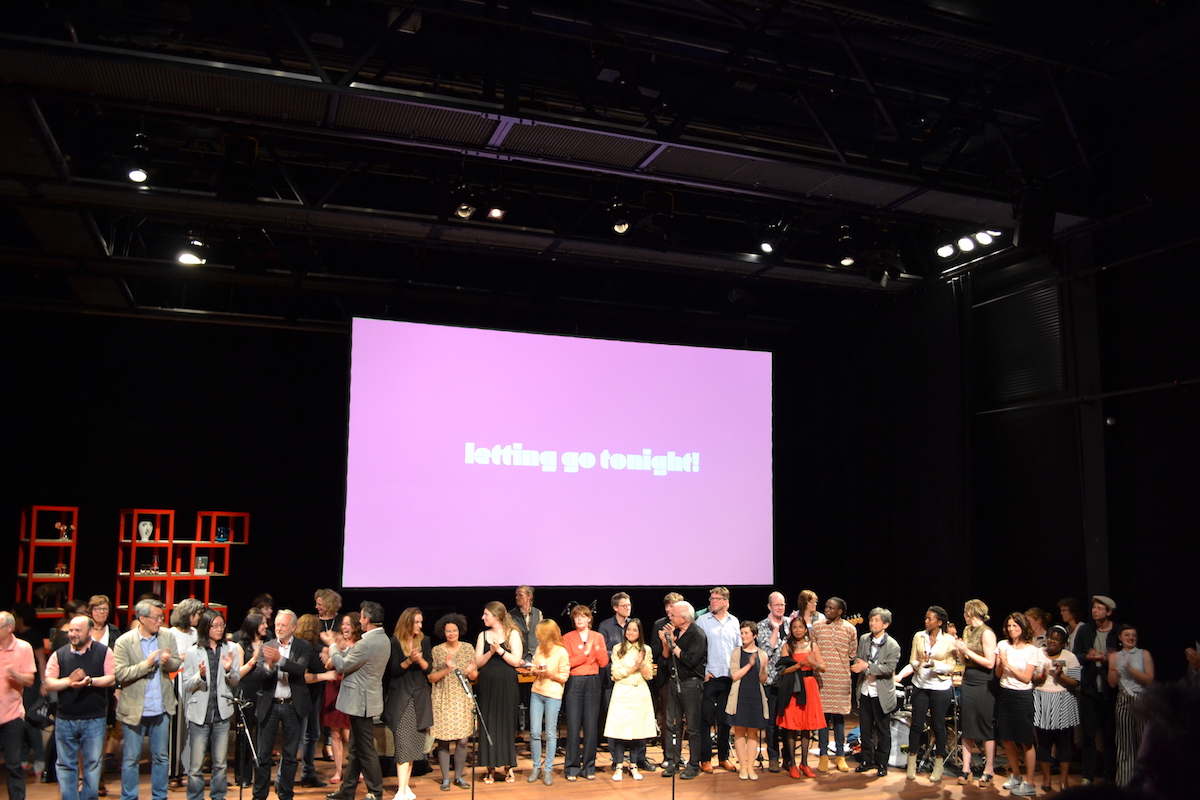
The closing ceremony took its title, “No one’s letting go of anyone tonight who hasn’t already left,” from a line in Mookie Katigbak-Lacuesta’s “Hush Harbor.”
About the Organization
While some things have shifted over the years—the festival was first started under the umbrella of the Rotterdam Foundation of Art and is now its own organization—the purpose of the festival has not changed; Poetry International aims to bring Dutch poetry onto a world stage and to present international poets to an international audience—in the Netherlands and online. The service they provide to the community is remarkable. Liliane Waanders, a literary journalist, noted that it’s not that often that one gets to hear a poet from Myanmar on stage performing with Dutch and English translations provided. She’s right. This high-reaching mission is fueled by year-round work of seven part-time staff and one full-time managing director.
The festival’s official origin story recounts the two founders, Adriaan van der Staay and Martin Mooij, returning from the London Poetry Festival in the late 60s determined to create a similar gathering in Rotterdam. The festival’s current programmer, Jan Baeke, let me in on a bit of lore: the founders are said to have first been inspired by the Spoleto festival in Italy where they saw Ezra Pound performing in his later years.
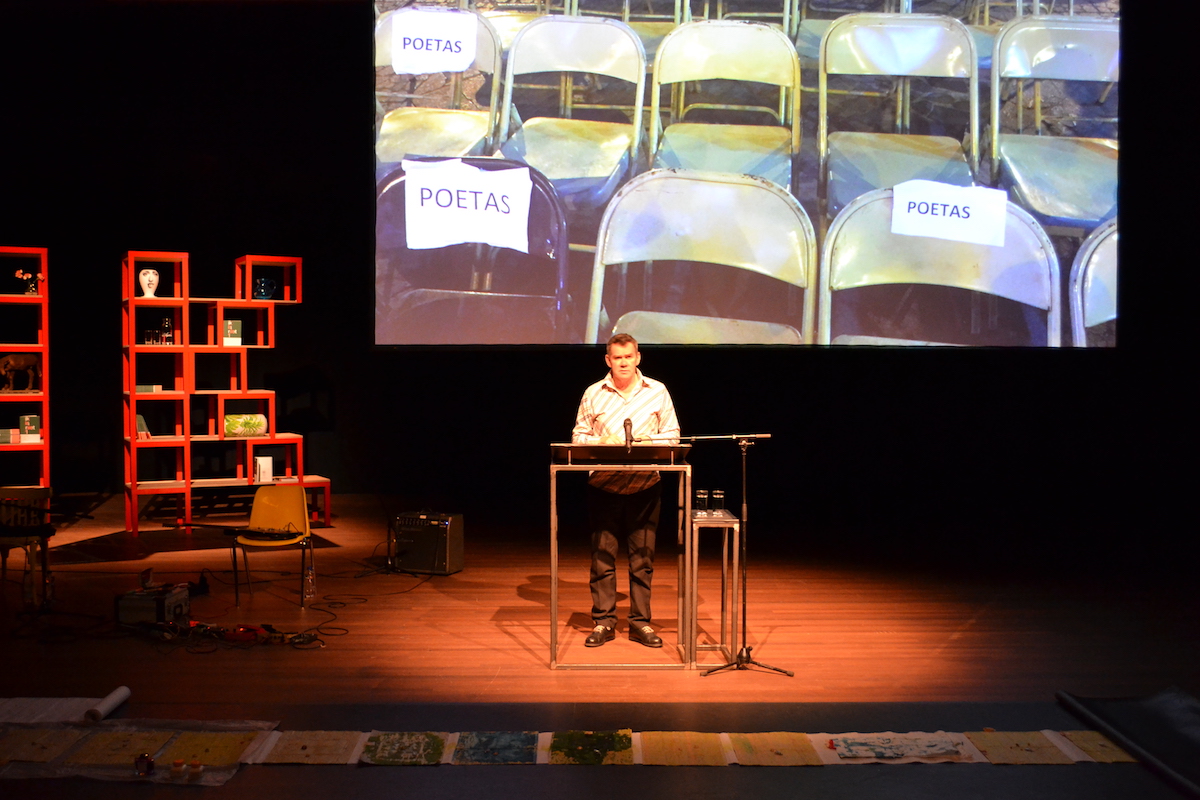
Poetry International Programmer Jan Baeke
In addition to the yearly festival, Poetry International coordinates a reading tour for nominees of the VSB Poetry Prize, one of the country’s most prestigious awards, and they organize Dutch Poetry Week festivities in late January/early February in collaboration with other organizations. Their website is a rich, multimedia experience. It combines the Poetry International’s festival pages, including a robust and growing digital archive of events, and a selection of international poems in the original language and in Dutch and English translation. Poetry International shares the curation of this ambitious web project with their partners in many of the represented countries, which at last count totaled ninety-five nations. The Poetry Foundation is Poetry International’s U.S. partner.
Though the Dutch government used to support arts organizations and individuals directly, the country now funds its arts programming through discipline-specific foundations kept separate from the government. These foundations—in this case the Dutch Foundation for Literature—handle tax and other governmental reporting and compliance issues and support organizations like Poetry International through a highly competitive grant process. The grant cycle is four years. The city of Rotterdam also provides substantial support to Poetry International and the rest of their budget is raised from a variety of sources, including individual donors. The festival manages to put on a spectacular event every year because of the financial support from the government and donors, but also because of the organization’s long history of innovation in and fine-tuning of its programming.
Laura Wetherington’s first book, A Map Predetermined and Chance (Fence Books), was selected by C.S. Giscombe for the National Poetry Series. She teaches in Sierra Nevada College’s low-residency MFA Program and co-edits textsound.org with Hannah Ensor. Follow her on Twitter and Instagram.

